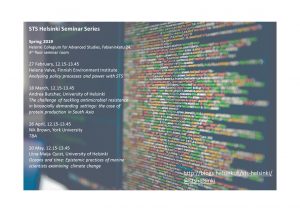29 January, 14.15-15.45 Room 10, Metsätalo, Fabianinkatu 39.
Jose A. Cañada, postdoctoral researcher at the University of Helsinki, Faculty of Social Sciences.
Local enactments of global health: thinking about scale-making with microbes
Abstract
What does it take for a phenomenon to be global? How many countries or regions need to engage with it? How does the material manifest in the global scale? Existing literature has argued that the global is not so by itself, but it is made of locally situated practices mostly enacted from Western technoscientific and policy spaces (e.g. Blok, 2010; Law, 2004; Tsing, 2005). Its impact, on the other hand, has the potential to be much wider than that. This is a topic of great relevance when looking at global health policies, the priorities that they formulate, and the implementations that they propose – although it applies to many globally formulated challenges such as climate, sustainability, or innovation, especially when elaborated in terms of development.
The session will reflect on the relevance of scale-making in global health challenges and, more specifically, in those that are formulated around the activity of microbial forms of life, such as pandemic threats and antimicrobial resistance (AMR). These cases are especially interesting because besides the complexities of the multi-scalar character of the global, they must deal with the microscopic scale of viruses and bacteria. This entails a struggle to make visible (or at least perceptible) something that is not for most involved actors. This mobilizes the use of different methods and practices (some more technical than others).
In global health, scale-making must be taken into account not only as part of the studied field, but also in our own practices as social researchers. Consequently, the lecture will formulate questions of relevance to scale-making not only from the perspective of how it is carried out by those who do global health, but also from the perspective of its study as a sociotechnical activity, reflecting on the methodological and analytical implications of studying global phenomena in situated spaces.
Jose A. Cañada is a postdoctoral researcher at the University of Helsinki, Faculty of Social Sciences. He has a PhD from the University of Helsinki (2018). He has been especially interested in the production of knowledge and material practices associated to sociotechnical controversies, working on topics such as pandemic preparedness and response, biobanking and the development of water infrastructures. He is currently working in the project Social study of antimicrobial resistance: health care, animals, and ethics (SoSAMiRe), where he studies issues related to AMR global policy-making, knowledge production, and implementation.
